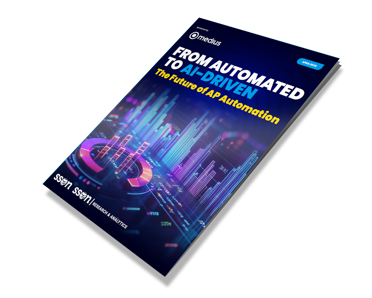How to prepare AP for year-end invoice volume and closing pressure
- Introduction
- The ultimate year-end checklist for finance teams
- Understanding the year-end invoice surge
- Common bottlenecks that stall AP during Q4
- How to prepare before the rush
- Managing volume during year-end
- Key metrics to monitor during peak volume
- How automation transforms year-end AP performance
- Before year-end, make sure your AP is ready
- Turning year-end pressure into next-year potential
Hear what's covered in this article:
As the fiscal year comes to a close, accounts payable (AP) teams face one of their most demanding periods. Invoices flood in from vendors finalizing projects and expenses, while finance leaders push to close the books quickly and accurately. The result? A spike in processing volume, approval bottlenecks, and added pressure on already busy teams.
To stay in control, AP departments must prepare in advance, building the right processes, tools, and visibility to manage high workloads without sacrificing accuracy or compliance. Below, we’ll explore the most common year-end challenges, how to mitigate them, and where automation can make the biggest difference.
The ultimate year-end checklist for finance teams
Year-end doesn’t have to mean late nights and last-minute chaos. Read this blog to get an actionable checklist that helps your team stay organized, close faster, and start the new year strong, with clear steps to reconcile invoices, balance accruals, and tie up loose ends.

Understanding the year-end invoice surge
Q4 often brings a perfect storm of activity for AP teams. Vendors rush to send invoices before cutoffs, internal departments push last-minute purchases, and finance leadership demands up-to-date data for forecasting. All this can quickly lead to backlogs and burnout.
Why invoice volume increases:
Vendor deadlines
Many suppliers want to close out accounts before the new year.
Budget utilization
Departments spend remaining funds to avoid budget reductions.
Project completions
End-of-year wrap-ups generate a wave of final billing.
When manual processes are in place, these spikes create significant inefficiencies. Without visibility or automation, AP teams spend more time chasing invoices than analyzing spend.
Pro tip: Conduct a review of your Q4 invoice volume trends from previous years to forecast expected increases. Historical data helps determine staffing, cash flow, and automation needs.
Common bottlenecks that stall AP during Q4
Even well-structured AP departments feel the strain when workloads climb. Recognizing the most frequent bottlenecks can help you prepare and respond before they cause major slowdowns.
When invoices pile up faster than they’re processed, payments get delayed, leading to missed discounts or strained vendor relationships.
Keying invoice details into ERP systems introduces errors and slows down approvals.
When AP, procurement, and finance use separate tools, invoices get stuck between systems.
Without real-time dashboards, teams struggle to track invoice status or identify bottlenecks.
Reduced staff or holidays in Q4 often mean fewer hands available to manage higher volumes.
Each of these issues contributes to the same problem, lost time, reduced accuracy, and last-minute stress. Addressing them early can make the year-end close far smoother.
How to prepare before the rush
The best way to manage end-of-year invoice volume is to start preparing before it begins. Early planning gives your AP team the control and bandwidth to handle unexpected surges confidently.
Create a detailed timeline
Outline all major closing activities, including invoice cutoff dates, reconciliation deadlines, and reporting milestones. Setting milestones by week helps teams stay organized and reduces last-minute surprises.
Automate wherever possible
Implementing or optimizing your AP automation solution allows high-volume processing with minimal manual intervention. Automated routing ensures invoices reach the right approvers instantly, cutting cycle times dramatically.
Reconcile accounts early and often
Perform regular reconciliations instead of waiting until the final week of the fiscal year. This helps catch discrepancies sooner and provides accurate financial data when it’s needed most.
Communicate proactively with vendors
Reach out to suppliers early to confirm invoice submission timelines and resolve outstanding balances. Clear communication minimizes disputes and helps prevent late arrivals during crunch time.
Standardize and document workflows
Consistency matters. Standardizing approval policies and workflows ensures every invoice is processed the same way, reducing confusion and training time during peak periods.
Go paperless
Digital invoices eliminate the risk of misplaced paperwork and make it easier to retrieve supporting documentation during audits or reconciliations.
Managing volume during year-end
Once the surge begins, focus on agility and visibility. The goal is to maintain throughput while ensuring accuracy and compliance.
Start by prioritizing high-value and time-sensitive invoices. These often have greater financial impact, such as those tied to major vendors or early payment discounts.
Next, use automation to flag exceptions, duplicate invoices, mismatched amounts, or missing purchase orders, so your team can focus on resolving issues rather than hunting for them.
Many AP teams also find it useful to establish daily progress check‑ins during the last few weeks of the year. These short meetings help identify bottlenecks quickly and ensure accountability across the department.

Pro tip: Create a shared dashboard tracking invoices by approval stage, received, pending review, awaiting payment, and completed. This gives management instant visibility and reduces email back-and-forth.
Key metrics to monitor during peak volume
To stay efficient and identify areas for improvement, monitor a few critical AP performance indicators throughout the close period:

-
Invoice cycle time
How long it takes from receipt to approval and payment.
-
Exception rate
The percentage of invoices requiring manual review or correction.
-
First-pass approval rate
How many invoices clear without intervention.
-
On-time payment ratio
Percentage of payments made within agreed terms.
-
Cash flow forecast accuracy
Ability to predict upcoming outflows accurately.
Tracking these metrics gives leadership insight into the effectiveness of your processes and helps justify continued investment in automation.
How automation transforms year-end AP performance
Automation gives AP teams a critical advantage during high-demand periods. By handling repetitive tasks automatically, AI-powered systems reduce delays, improve accuracy, and provide real-time visibility across all invoices.
With Medius AP Automation, you can:
Streamline invoice capture and validation to eliminate manual data entry.
Route invoices instantly for approval based on pre-set workflows.
Identify duplicate or fraudulent invoices with intelligent exception handling.
Maintain visibility into every transaction, even during high-volume weeks.
Generate accurate reports for finance leaders and auditors with a single click.
Together, these capabilities ensure your AP function remains steady, even when pressure peaks.
Before year-end, make sure your AP is ready
Don’t let manual workflows or late approvals derail your close. This SSON white paper, “From Automated to AI-Driven: The Future of AP Automation,” reveals how AI-powered automation helps finance teams handle year-end pressure with ease, improving accuracy, speeding reconciliation, and freeing time for strategic work.
Turning year-end pressure into next-year potential
While the year-end surge may be unavoidable, its impact can be controlled. The right combination of preparation, automation, and visibility enables finance teams to close efficiently and start the new year stronger.
By streamlining workflows, improving accuracy, and freeing up staff time, AP teams gain the bandwidth to focus on more strategic initiatives like forecasting and supplier optimization.

Set your AP team up
for success.
Discover how Medius can help you handle high-volume periods efficiently and build a smarter, more resilient financial operation for the year ahead.







